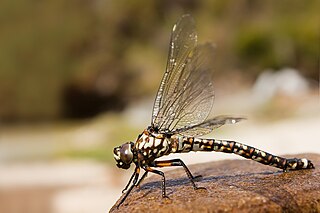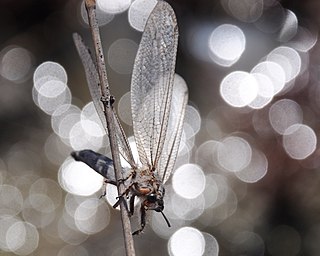
The Aeshnidae, also called aeshnids, hawkers, or darners, is a family of dragonflies, found nearly worldwide. The family includes some of the largest dragonflies.
Eustace Mandeville Wetenhall Tillyard was an English classical and literary scholar who was Master of Jesus College, Cambridge from 1945 to 1959.

Coenagrionidae or are a family of damselflies, also known as pond damselfies, in the order Odonata and the suborder Zygoptera. The Zygoptera are the damselflies, which although less known than the dragonflies, are no less common. More than 1,300 species are in this family, making it the largest damselfly family. The family Coenagrionidae has six subfamilies: Agriocnemidinae, Argiinae, Coenagrioninae, Ischnurinae, Leptobasinae, and Pseudagrioninae.

Robert "Robin" John Tillyard FRS was an English–Australian entomologist and geologist.

Edward Everett Holland was an American lawyer, banker, and politician who served as a U.S. Representative from Virginia from 1911 to 1921.

The Berothidae are a family of winged insects of the order Neuroptera. They are known commonly as the beaded lacewings. The family was first named by Anton Handlirsch in 1906. The family consists of 24 genera and 110 living species distributed discontinuously worldwide, mostly in tropical and subtropical regions. Numerous extinct species have also been described. Their ecology is poorly known, but in the species where larval stages have been documented, the larvae are predators of termites.

Alderflies are megalopteran insects of the family Sialidae. They are closely related to the dobsonflies and fishflies as well as to the prehistoric Euchauliodidae. All living alderflies – about 66 species all together – are part of the subfamily Sialinae, which contains nine extant genera.

Scoparia is a grass moth genus of subfamily Scopariinae. Some authors have assigned the synonymous taxon Sineudonia to the snout moth family (Pyralidae), where all grass moths were once also included, but this seems to be in error.

The Tasmanian darner,, is a species of large dragonfly in the family Telephlebiidae, which includes some of the world's largest dragonflies. It is found in Tasmania, Australia. The species was first described by Robert Tillyard in 1916 and inhabits streams and rivers.

Austroaeschna is a genus of dragonflies in the diverse family Telephlebiidae.
Dendroleontinae is a subfamily of Myrmeleontidae, the antlions.
Dendroleontini is a tribe in the antlion subfamily Dendroleontinae.

Acanthaclisini is a tribe in the antlion subfamily Acanthaclisinae.

The Nemoleontinae are a subfamily of ant-lions, erected by Nathan Banks in 1911.
Nemoleontini is an antlion tribe in the subfamily Myrmeleontinae.

Telephlebia is a genus of dragonflies in the family Telephlebiidae, endemic to eastern Australia. Species of Telephlebia are medium to large, dark chestnut brown dragonflies with dark markings on the leading edge of their wings. They are crepuscular and fly at dusk.

Glenurus is a genus of antlions in the family Myrmeleontidae and typical of the tribe Glenurini. There are about 12 described species in Glenurus.

Dendroleon is a genus of antlions in the family Myrmeleontidae. There are more than 20 described species in Dendroleon.

Drepanacra binocula, known as the Australian variable lacewing, is a species of brown lacewing in the family Hemerobiidae, found across Australia and New Zealand, including Lord Howe Island, Norfolk Island and the Kermadec Islands.















